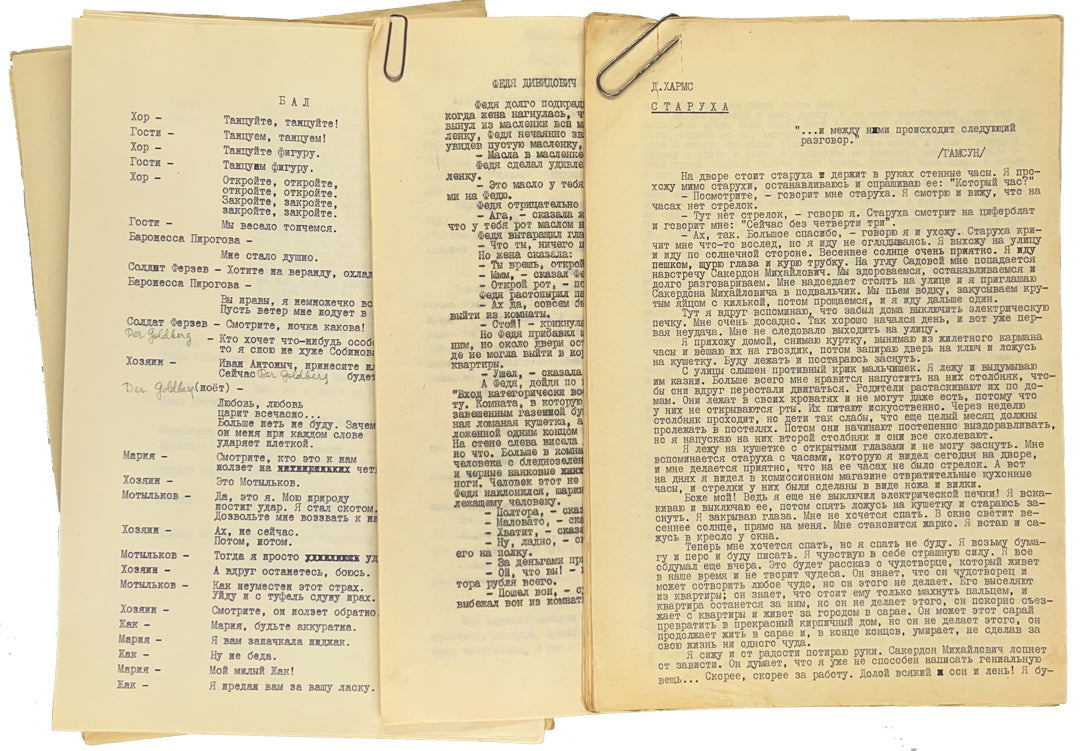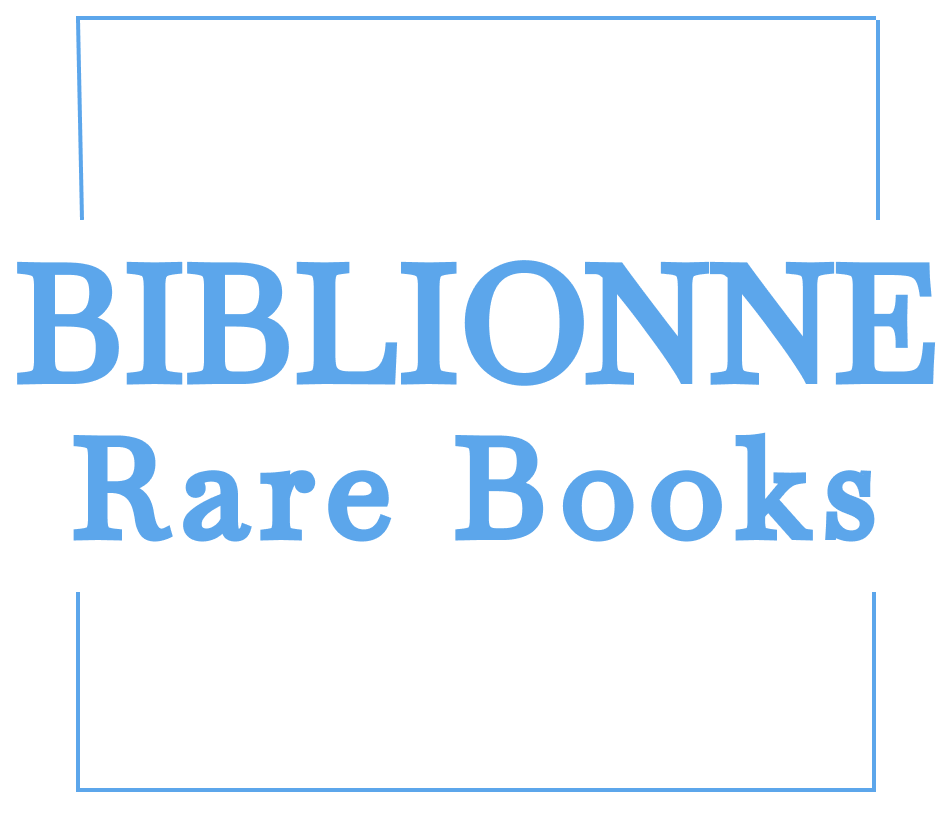Kharms, Daniil
Intriguing and unusual collection of samizdat containing 45 works.
Intriguing and unusual collection of samizdat containing 45 works.
Regular price
$2,270.00 USD
Regular price
Sale price
$2,270.00 USD
Unit price
per
Couldn't load pickup availability
Collection of typescripts containing 45 works by Daniil Kharms.
N.p., [late 1960s-late 1970s?].
30x21 cm., [78] l.
Recto only. The pagination is chaotic. Some stories are duplicated.
Overall wear, small tears to edges, soiling, with few manuscript additions in pencil and ink.
This collection of typescripts includes works by Daniil Kharms (1905-1942), one of the most prominent and important avant-gardist and absurdist Russian poets and writers, the founder of the avant-garde collective Oberiu.
During his lifetime, only his works for children were published. After Kharms' second arrest and subsequent death in a prison hospital, his archive was saved by his friend, the musician and literary critic Iakov Druskin (1902-1980). Druskin secretly held Kharms' archive and only in the mid-1960s was he able to begin publishing Kharms' works. He opened the archive to researchers, and simultaneously Kharms began to appear in samizdat (underground press). One of the crucial sources for such typescripts was the samizdat book 'Izbrannoe', compiled by the public figure, human rights activist, and member of the Moscow Helsinki Group, Valerii Abramkin, in the mid-1970s. By the late 1960s, Kharms' works were also being published abroad, and in 1974, his first book was published in Würzburg, followed by a 4-volume collection of works published in Bremen in the late 1970s and 1980s. In the USSR, the first relatively complete collection of Kharms' works was only published in 1988.
Regarding this collection of typescripts, it includes 45 works by Daniil Kharms from the years 1927-1939: the novel 'The Old Woman', as well as short pieces from the 'Incidents' ('Blue Notebook, No. 10', 'Incident', 'The Plummeting Old Women', 'An Event on the Street', 'A Sonnet', 'Petrov and Kamarov', 'The Optical Illusion', 'Pushkin and Gogol', 'The Carpenter Kushakov', 'The Trunk', 'The Incident with Petrakov', 'The Story of the Fighting Men', 'The Dream', 'The Young Man who Astonished a Watchman', 'Four Illustrations of How a New Idea Disconcerts a Man Unprepared for It', 'Losses', 'Makarov and Petersen', 'A Lynching', 'An Encounter', 'An Unsuccessful Show', 'Cluk', 'What They Sell in the Stores Nowadays', 'Mashkin Killed Koshkin', 'The Hunters', 'An Historical Episode', 'Fedya Davidovich', 'Anecdotes from the Life of Pushkin', 'The Start of a Very Nice Summer’s Day (Symphony)', 'Pakin and Rakukin'), 'How I Tormented One Company', two letters to Tamara Lipavskaia, 'A Story', 'The Cashier', 'The Ball', 'Hnyu – Friend of the Lamp', 'The Fall, Or Knowledge of Good and Evil', 'The Sentry and Barbara', 'Magic Tricks', 'Fire', 'Mighty Air Looked Through the Window…', 'Mary Comes Out, Bowing Deeply…', 'The Play', 'From the Notebook', 'Symphony No. 2', and 'Fish Oil'.
It's difficult to determine the exact sources that formed its basis, but it's likely that multiple sources were involved. For instance, the story 'How I Tormented One Company', along with two accompanying letters by Kharms found in this collection, contains similar references to those found in the magazine 'Voprosy Literatury' (Literary Issues), No. 11, 1973. Additionally, it's worth noting an intriguing variation in titles. The short piece from the 'Incidents' series titled 'Mashkin Killed Koshkin' is commonly known by this title. However, in this typescript, it is titled 'Myshkin Killed Koshkin', a version more aligned with Kharms' style (the surname Myshkin derived from the word 'mouse', while Koshkin from 'cat'). Unfortunately, the original manuscripts are housed in the National Library of Russia and the Pushkin House, making verification challenging.
Additionally, alongside Kharms' works, these typescripts also include five poems by another important Oberiu poet, Alexander Vvedensky (1904-1941), who tragically died while imprisoned: 'The Meaning of the Sea', 'The Joyful Man Franz', 'The Sick, Who Became a Wave', 'Two Little Birds, Grief, Lion and Night', 'Fact, Theory and God'.
It's difficult to determine the exact sources that formed its basis, but it's likely that multiple sources were involved. For instance, the story 'How I Tormented One Company', along with two accompanying letters by Kharms found in this collection, contains similar references to those found in the magazine 'Voprosy Literatury' (Literary Issues), No. 11, 1973. Additionally, it's worth noting an intriguing variation in titles. The short piece from the 'Incidents' series titled 'Mashkin Killed Koshkin' is commonly known by this title. However, in this typescript, it is titled 'Myshkin Killed Koshkin', a version more aligned with Kharms' style (the surname Myshkin derived from the word 'mouse', while Koshkin from 'cat'). Unfortunately, the original manuscripts are housed in the National Library of Russia and the Pushkin House, making verification challenging.
Additionally, alongside Kharms' works, these typescripts also include five poems by another important Oberiu poet, Alexander Vvedensky (1904-1941), who tragically died while imprisoned: 'The Meaning of the Sea', 'The Joyful Man Franz', 'The Sick, Who Became a Wave', 'Two Little Birds, Grief, Lion and Night', 'Fact, Theory and God'.


